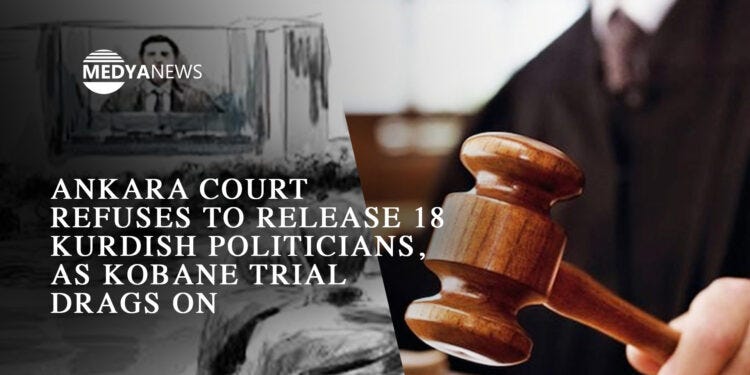Ankara court refuses to release 18 Kurdish politicians, as Kobane trial drags on
The court ruled in favour of the prosecution’s application for the continued imprisonment of 18 Kurdish politicians. Commentators believe that the verdict in the Kobane trial was delayed to avoid further criticism of Erdoğan’s human rights record ahead of Washington visit.
Share post
The 82nd hearing of the Kobane trial was held on Wednesday 18 April in Ankara. A total of 108 Kurdish politicians are on trial in the high-profile case, for charges dating to 2014 related to social media posts that allegedly fuelled mass uprisings in protest to Turkey’s complicity in the ISIS siege of Kobane.
Unrest at the October 2014 demonstrations lead to violence and multiple deaths. But the vast majority of the 48 people killed were pro-Kurdish People’s Democratic Party (HDP) supporters. Despite this, the prosecution has been used as an opportunity to repress the HDP. The case has been criticised as a clear political attack, and part of the efforts to shut down the party. The European Court of Human Rights has ruled that the seven-year-long imprisonment of the HDP’s former co-chairs, Figen Yüksekdağ and Selahattin Demirtaş, is illegal.
The verdict was expected, but it has been delayed. The court cited the substantial evidence in the case and the need to finalise trial transcripts as the reason for the postponement. Instead of a conclusion to the trial, the 18 people still being held in prison were called in for a ‘detainee review’.
Some commentators have conjectured whether the ruling Justice and Development Party’s (AKP) losses in the municipal elections signify a change of political atmosphere that could affect the trial. Others pointed out that the delay was due to the Turkish state not wanting the court’s verdict to coincide with President Recep Tayyip Erdoğan’s visit to the US. If the defendants were to be found guilty and receive long prison sentences it could spark fresh criticism of state repression in Turkey.
Turkey is under increased scrutiny at the moment, after a US Congressional hearing examined Erdoğan’s human rights record. The hearing comes at an inconvenient time for the Turkish state, just before the president’s state visit to Washington.
Only five of the defendants attended court on 17 April, many others watched the proceedings through SEGBIS – the court’s electronic system.
People’s Equality and Democracy Party (DEM) Co-Chairs Tülay Hatimoğulları and Tuncer Bakırhan, together with the defendants’ lawyers and members of the Law and Human Rights Commission made a statement at Sincan Prison ahead of the hearing, calling for the release of the prisoners.
A delegation of DEM Party representatives attended court to monitor the case. The Republican People’s Party and Workers’ Party of Turkey (TİP) also sent members to listen to proceedings.
The defence demanded the release of the prisoners, noting that the maximum pre-conviction detention period had been exceeded. The state prosecutors denied this and demanded the continued detention of the detainees on the grounds of “concrete evidence of strong suspicion of guilt” and a “suspicion of flight.” The court eventually ruled that all defendants should remain in prison.
The defendants were then given the chance to speak. “While the people were being slaughtered by ISIS criminals, we could not remain silent, and we protested against the government that remained silent,” defendant Alp Altınörs told the court.
Altınörs emphasised that the calls for solidarity with Kobane from both inside and outside Turkey were an important part of obtaining international support and averting a further ISIS massacre in Kobane, a Kurdish town in northern Syria. “Our call was answered. That corridor was opened, and genocide was prevented. And because the genocide was prevented, we have been imprisoned for four years,” he said. “I have been imprisoned for four years for a tweet that was legitimate, legal, and democratic—a call against ISIS terrorism.”
Defendant Günay Kubilay highlighted the political nature of the charges. “The political power, which could not risk fighting the HDP on legitimate grounds, resorted to illegitimate means and initiated this conspiracy trial,” he said.
Kubilay pointed out that the HDP was justified in calling people to the streets in 2014: “This was a legitimate call against ISIS barbarism. If something similar happened today, we would make the same call.”
Former HDP co-chair Selahattin Demirtaş spoke over a video link from Sincan Prison. “I demand the freedom of all my friends,” he told the court.
The trial continues, the next hearing is scheduled for 16 May, a week after Erdoğan’s meeting with US President Biden scheduled on 9 May.




